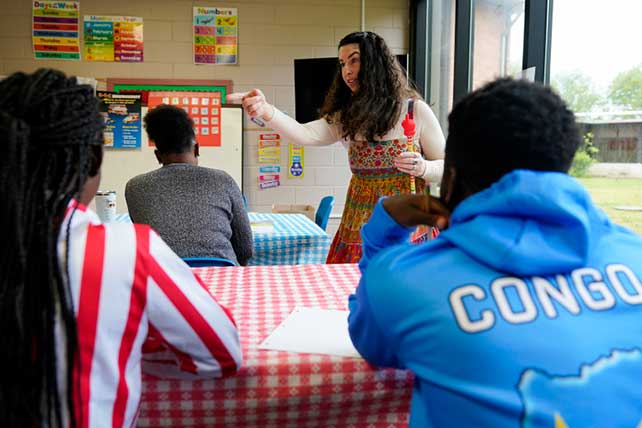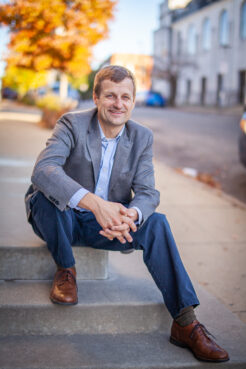“It’s like delivering a baby when somebody arrives in Pittsburgh, not knowing the language and having zero resources,” said Dr. Susan Balaan, a Shadyside Presbyterian lay leader who serves on the resettlement committee.
RELATED: Faith Groups Say They’ll Help Refugees Despite Trump Order. But They’ll Need Help.
The co-sponsors’ donations, as well as hands-on assistance such as furnishing apartments and buying groceries, besides bridging gaps the State Department money doesn’t cover, also come with personal contact and emotional support.
“They are a different type of support system,” said Smith-Tapia. “They can take the family to the museum, they can take the family to the park, to do activities that we generally due to our time restrictions and limited capacity cannot prioritize. We are focused on survival mode.”
Temple Sinai also hired one refugee, Carlos, who arrived from Colombia seven months ago. The job has allowed him to purchase a car. “It has been a great help to me in getting to work and taking the kids to day care,” he said.
Carlos said he is concerned about Trump’s targeting of refugees and immigrants. “A refugee living in the United States … is already scared. Suddenly, you don’t know if they can be exported to their country, and things would get worse,” he said.
But the bulk of JFCS’ financial support still comes from the State Department. “We all have a sense how important those resources are in the early months, and how positively vulnerable people will be when they’re cut off,” said Balaan. “We’re willing to step up and try to fill the void, but some of it we can’t. Some of it just requires somebody who is doing this professionally.”
Timothy Young, director of public relations at Global Refuge, a Lutheran resettlement agency currently serving some 6,000 refugees, said thousands of families face food insecurity, homelessness and isolation because of the White House’s decision. Federal funds are most crucial in the families’ first three months in the U.S., as they integrate into their new communities.
“Rent is due next week, and local municipalities, like anyone, don’t want to see refugee families face eviction or sleep on the street, right?” he said. “This could have a devastating impact on families who are already here, who have gone through an extensive vetting process to reach safety.”
Mark Parker. (Courtesy photo)
In summer of 2023, after Global Refuge connected a Guatemalan family to the Breath of God Lutheran Church in Baltimore, the family was housed in a church-owned home, and federal funding initially covered rent, groceries and cash assistance. The church’s volunteers helped family members secure employment, apply for permanent residency, buy a car and obtain driving licenses, or else drove them to job interviews.
“It gave us the opportunity to take our interests and our Christian commitment to welcome and walk alongside some of the most vulnerable and traumatized people in the world,” said Mark Parker, a pastor at the church. In Guatemala, the family had received death threats because the father and a son had worked for the police force. After both were murdered, the family was granted refugee status.
Parker estimated the total cost of supporting the family for the first three months at close to $10,000. “After 90 days, with some exceptions, you’re expected to have your life up and running and be self-supporting in this country,” said Parker, but added, “Given the scale of transition in life that we’re talking about and given the success that the program has in helping people get established here, it’s remarkable how much happens with so little investment.”
The church’s refugee team is waiting to see how the federal funding cuts will impact its budget but remains committed to pursuing its work with the help of the community. Soon, the team hopes to be able to welcome eight families.
Spike Carlsen was part of a team that helped resettle an Afghan family in Stillwater, Minnesota, three years ago, working with an interfaith coalition organized by Ascension Episcopal Church of Stillwater, which is next door to Trinity Lutheran Church of Stillwater, Carlsen’s church. Word of the coalition spread, and soon a retirement community’s social justice committee and the Eastern Twin Cities Islamic Center of Afton became involved. “It just kind of fell together,” said Carlsen.


